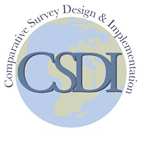- Home
- About us
- Initiatives
- Events
- 2024 CSDI Workshop
- Past Events
- 2023 CSDI Workshop
- 2022 CSDI Workshop
- 2021 Virtual CSDI Workshop
- 2019 CSDI Workshop
- 2018 CSDI Workshop
- 2017 CSDI Workshop
- 2016 3MC Conference
- 2015 CSDI Workshop
- 2014 CSDI Workshop
- Archive
- Forum
- Additional Resources
- Contact Us


Fifth International Workshop on Comparative Survey Design and ImplementationChicago, March 29-31, 2007Hosted by the College of Urban Planning and Public Affairs and the Survey Research LaboratoryUniversity of Illinois at Chicago
VenueStudent Center East(formerly Chicago Circle Center)750 South Halsted Street
University of Illinois at Chicago
Meeting Rooms at the Center
Thursday and Friday: Room 605
Saturday: Room 713
Acknowledgements
The College of Urban Planning and Public Affairs and the Survey Research Laboratory at UIC have graciously funded the meeting, breakfasts and lunches and the shuttle bus for the tour.Without local hosts CSDI workshops could not be organized without conference fees and the other costs often linked to hotel conference venues.We also gratefully acknowledge Research Support Services and ZUMA, who kindly financed the reception on Thursday evening.We would like to thank ZUMA staff, in particular Maria Kreppe-Ayguen, and University of Nebraska-Lincoln GRA Ana Villar for helping organize and coordinate the event.
Thursday 29 March
8.30 Continental breakfast (next to meeting room, R 6005)
9.00 Welcome
Robin Hambleton, Dean of the College of Urban Planning and Public Affairs, UIC, and Timothy Johnson Director of the Survey Research Laboratory, UIC.9.20 Technical arrangements: workshop, tour, receptionJanet Harkness9.30 Questionnaire DesignChair: Brad Edwards Sue Ellen Hansen and Janet Harkness:Where Should Comparative Questions Come From? Rory Fitzgerald:Improving Documentation of Questionnaire Development. Tzu-Yun Chin, Yongwei Yang, Janet Harkness, Ipek Bilgen Ana Villar, and Wei Zeng, and members of the ISSP work groups on Questionnaire Design and Translation:Developing answer scales in multilingual studies. 10.30 Break10.50 PretestingChair: Trish Gallagher Manuel de la Puente:Cognitive Testing of the Spanish Language American Community Survey (ACS) CAPI/CATI Instrument: Lessons Learned and Plans for Future Research. Patricia Goerman, Rachel Caspar, Georgina McAvinchey, Rosanna Quiroz, and Mandy Sha:Census Bureau Bilingual Questionnaire Research: Preliminary Results of Cognitive Testing. Kristen Miller, Gordon Willis and Janet Harkness:
Using Cognitive Testing Techniques to Examine Question Comparability. 12.00 Lunch (next door to meeting room)13.15 Pretesting (continued)Chair: Lauren Doerr Eleanor Gerber:Considerations for Training Cognitive Interviewers for Pretesting Translations. Yuling Pan and Alisú Schoua-Glusberg:Cognitive Interviewing in Non-English Languages: A Cross-cultural Perspective. 14.00 Data collectionChair: Beth-Ellen Pennell Nicole Schöbi and Dominique Joye:Data Collection in Switzerland and Data Quality. Lessons from the ESS and the ISSP. Martine Quaglia:Some Questions Raised While Piloting a Survey on International Migrations Conducted in Senegal and in France. 15.00 Data collection continuedChair: NN Bob Belli and Mario Callegaro:Cultural Variability in Event History Calendar and Conventional Questionnaire Interviews. Ineke Stoop:If it bleeds, it leads: the impact of media-reported events. 15.40 Update on initiatives, research projects and coming eventsChair: Janet Harkness Wendy Thomas:Historical Census Materials of the Minnesota Population Center. If anyone has a longer announcement to make, please inform J. Harkness asap if possible 17.00 Close17.30 ReceptionHosted by Research Support Services and ZUMAFriday 30 March8.15 Continental breakfast8.45 Welcome Elbert Schorsch, Associate Dean of the College of Urban Planning and Public Affairs, UIC. 9.00 NonresponseChair: NN Tom Smith:Procedures to Reduce Nonresponse in Cross-Cultural Perspective. Annelies Blom, Peter Lynn and Annette Jäckle:Using Para-Data to Better Understand Cross-National Differences in contact rates. 9.40 Testing and AnalysisChair: Tim Johnson Michael Braun:Which Procedure Allows Us to See What? – Relative Advantages of Multidimensional Scaling, Correspondence Analysis and Multilevel Modeling in Detecting Problems of Functional Equivalence. Emilia Peytcheva:Culture Dependent Contrast Effects. Ana Villar:Answer Scales, Translation and Response Styles. Peter Mohler, Beatrice Rammstedt and Kathrin Wohn:Value Measurement Re-visited – Hofstede, Schwarz and Inglehart. 11.20 Data, Tools and Documentation Mary Vardigan:The DDI Initiative. Peter Mohler, Beth-Ellen Pennell, Janet Harkness and Karl Dinkelmann:
Survey Translation Management Technologies. Kirsten Alcer, Judi Clemens and Christina Lien, Beth-Ellen Pennell, (ISR); Janet Harkness, Ana Villar and Ipek Bilgen (UNL):Guidelines for Best Practice in Cross-Cultural Surveys. Evi Scholz:Documenting the ISSP Background Variables. 12.40 Lunch Break13.30 CSDI workgroup reports 2006-2007(including a new group on adaptation) 14.20 Harmonization Peter Granda, Reto Hadorn and Christof Wolf:CSDI Harmonization Group. Fundamental Questions on Harmonizing Survey Data. 14.50 Close15.00 Departure for Frank Lloyd Wright Architecture
Tour. Please note: entrance fee is $10 (see opposite).Opportunity to have dinner togetherSaturday 31 March8.30 Breakfast9.00 Plenary room 7139.15 Workgroups meet individually for two hours and then report to the plenary.11.15 Plenary reports12.00 Close of WorkshopAbout the tour… Our local hosts have kindly funded an University shuttle bus to and from the Chicago District to a guided tour of a Frank Lloyd Wright building.Participation is voluntary but we each pay our own entrance fee. Because we arrive at 4 pm, this is only $10 per person. However, you need to register and pay in advance. You will be asked to decide and to pay on Thursday morning. Maria Kreppe-Ayguen from ZUMA will also email about participation Frank Lloyd Wright (June 8, 1867–April 9, 1959) was one of the most prominent and influential architects during the first half of the 20th century. He developed a series of highly individual styles over his extraordinarily long architectural career (spanning the years 1887-1959) and influenced the entire course of American architecture and building. To this day, he remains probably America’s most famous architect.